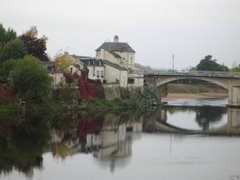Fregola and Clams, Stolen from Lupa
The other night a friend and I unexpectedly wound up at Lupa for a light late night dinner. We ordered a few little things to start, Romano beans with ricotta (good), house cured tongue (ridiculously delicious), and clams with Fregola and basil. We then had the best Spaghetti alla Carbonara that I've ever eaten. A cloud of earthy pungency from the guanciale in every bite.
As good as everything was, it was the Fregola that I was thinking about the next day, a dish that had great potential but, if I may say so, was not perfectly executed. At Lupa the clams are very salty, I would say too salty. And the Fregola are perhaps cooked too long - they offer no resistance when chewed. Or perhaps they are using a brand that doesn't toast the pasta long enough, as they didn't have that nutty taste that I like. It didn't matter much because the dish tasted great - salty clams, Fregola, and the surprising lift of fresh basil. I decided that I had to try to make the dish at home.


Then I added the cooked Fregola and spoonful of their cooking liquid, then the clams and their cooking liquid, and simmered for a few minutes on very low heat, to try to marry the flavors and extract any remaining starch from the Fregola to get a little sauce. At the last moment I added the chopped basil and tossed the dish.
What to drink with this dish? At Lupa, I was charged with selecting a wine and I tried to get something that would go with everything we ordered. I chose what I hoped would be a light and snappy red wine reminiscent of a Beaujolais, the 2007 Luigi Giusti Lacrima di Morro D'Alba, a wine from the Marche. It was fine, but not so great with the Fregola dish. At home I wanted a white, something saline and brisk.







3 comments:
Yours is a predicament I share. Natalie doesn't eat the shellfish but she does like the txakoli. Maybe we should trade schemes/notes for the future.
Cheers,
Joe
The Spanish wine sounds great. I wish I could find it where I am currently living.
I like to add some chopped basil during cooking, in successive pinches so the flavor really suffuses the dish. Then more at the end to garnish and add the green top notes. It comes out more basil-y that way I think.
I have yet to find any Txakolí up here, which is a pity since it's nightshade season and Basque flavors are called for.
Post a Comment